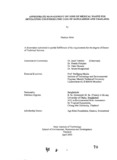| dc.description.abstract | The primary goal of this research was to formulate appropriate environmental management
options for medical waste in developing countries. The purpose was to improve the health
conditions of the people and environmental quality of developing countries with special
emphasis on Bangladesh. Therefore, the overall objective of this study was to assess the
effects of disposed medical wastes on health and the environment and to develop a
management intervention to improve the medical waste disposal system in developing
countries, especially Bangladesh and Thailand. Specific objectives of the study were to ( 1)
review the current status of hospital waste management (policy, regulation and practices)
in Bangladesh and Thailand and draw on references from other developed countries; (2)
compare the management techniques and practices in Thailand and Bangladesh related to
proper handling and disposal of medical waste; (3) determine the effectiveness of
infectious waste handling and disposal by testing pathogens; and (4) recommend
appropriate management options for medical waste, in developing country specifically in
Thailand and Bangladesh.
The study was conducted mainly in 2 cities in Bangladesh and in 2 cities in Thailand. The
study concentrates on hospital's waste generation, management and waste disposal sites.
Health and environmental aspects of waste in and out of hospital premises and disposal
sites were taken into account. Data and information were collected (March 2000 to March
200 1) through (i) literature review (ii) secondary data (iii) interview (iv) field investigation
(v) questionnaire survey (vi) laboratory analysis (vii) discussion (viii) observation and (ix)
case studies.
The overall situation analysis showed evidence of a lack of proper attention given by
hospital authorities. There was a lack of resource availability; training, monitoring, and
evaluation; adequate Jaw and negligence in implementation, enforcement of existing law in
proper medical waste management in Bangladesh and Thailand. It was also observed that
Thailand has a better situation compared to Bangladesh in relation to infectious waste
management, training, guidelines and regulations. A few identified problems related to
waste management were lack of cooperation between different agencies; lacks of proper
waste management policy, specified standards, and regular monitoring. Resource
availability, skilled manpower, and awareness should also be taken into account to address
the proper medical waste management issue. Overall findings also indicate that there was a
lack of in in-house management of medical waste in both countries to some extent. There
were good initiatives found in the case studies of both countries, such as, building
awareness among local communities with higher authorities; using a bottom-up approach
of management; involvement of local communities and all stockholders in planning and
implementation of projects; in-house training and evaluation; good housekeeping as well as
low cost technology of collection, storage, treatment and disposal; and sharing the facilities
with small hospitals.
Improvements in medical waste management involve a number of activities, which can be
undertaken in a series of small steps on the road to improvement. Considering the whole
situation there are some specific suggestions and recommendations for medical waste and
infectious waste management. These were adequate in-house treatment/ management; cost
reduction of management; formulation and enforcement of laws and regulations.
Suggestions were made for each aspect that influences or relates to medical waste
management. An action plan with appropriate options has been given for Bangladesh and
Thailand at the end of this dissertation. | en_US |

